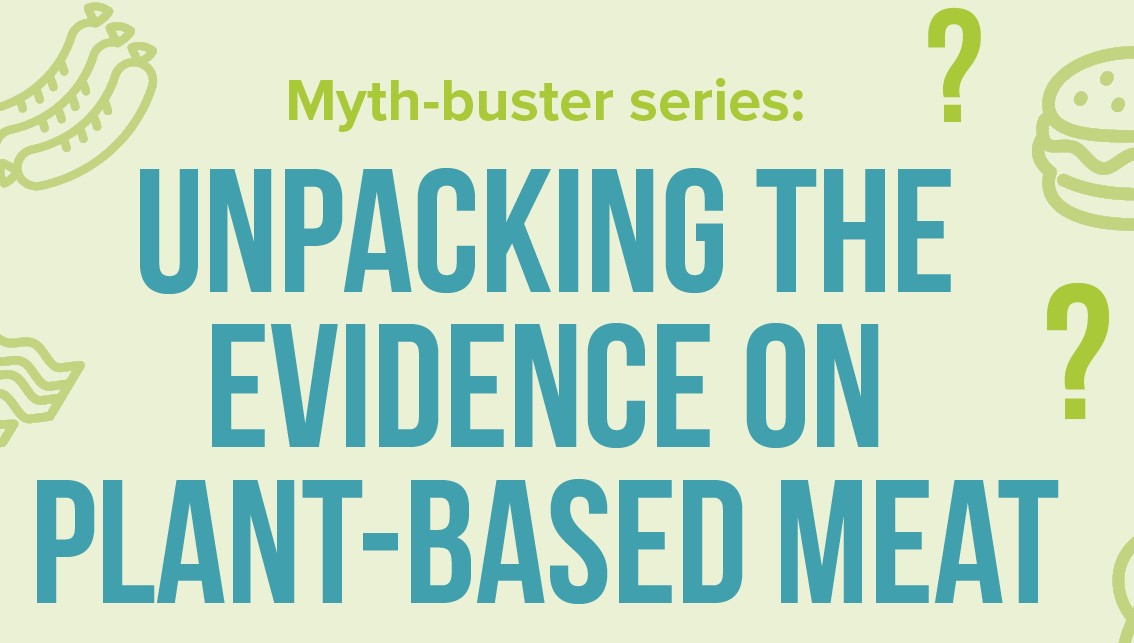Our recent report investigating the health and nutrition of plant-based meats took a look at the evidence around food processing. There is a wide range of processed foods in the supermarket, as almost all foods have been processed to some degree – frozen, chopped, cleaned, blended, dehydrated, heated and more. Plant-based meat undergoes advanced levels of processing, as combinations of heat, chemical and mechanical stresses via processes like protein isolation and extrusion are applied to convert globular plant proteins into a fibrous, textured strand resembling those found in animal muscle.
From a nutritional standpoint, processed and even ultra-processed foods can provide key nutrients, with nutrients such as protein naturally retained throughout processing. Often when we think about processed foods what comes to mind are less nutritious foods: snack and junk foods such as chips and lollies. However, a large proportion of the foods in Australian diets are considered processed.
In fact, the most recent nationally representative survey of Australian diets shows that 42% of Australian diets are ultra-processed foods, while one-third of the average daily meat consumption for Aussie adults is non-lean or processed meats – the very foods health experts recommend limiting. With this in mind, our recent report, Plant-Based Meat: A Healthier Choice?, set out to explore whether plant-based meats could be a healthier swap for these conventional meats in people’s diets.
Like conventional sausages and schnitzels, plant-based meats are also processed foods, though as our report found, they do offer benefits compared to similar conventional meats, like dietary fibre and considerably lower saturated fat. While it is important to be reducing the amount of processed meats in people’s diets, it’s also important to understand if the same criticisms of processed foods should be applied to plant-based meats.
The NOVA food classification, a system that identifies and defines levels of processing in foods, is the system most used by health experts when discussing the health impacts of processed foods. It categorises levels of processed foods as:
– Unprocessed or minimally processed foods
– Processed culinary ingredients
– Processed foods
– Ultra-processed foods
Within the NOVA system, both conventional meat products like burgers, sausages, hot dogs and other reconstituted meat products, as well as plant-based meats, would be considered ‘ultra-processed’ foods.
A recent review of largely observational studies identified a link between intake of ultra-processed foods and at least one adverse health outcome (such as being overweight and obese, and all-cause mortality) in most studies analysed. The association was most common in people eating higher levels of ultra-processed food consumption. Research into consumption of ultra-processed foods is in its infancy, so researchers have only hypothesised about the reasons behind these observations, not yet proven them.
Our report explores (from page 35) whether some of these concerns should apply to plant-based meat, simply because they are deemed ‘ultra-processed’. In short, here’s what we found on three key impacts of processing:
Impact: Consumption of processed foods leads to diets with poor nutritional profiles high in fat, saturated fat, refined carbohydrates, sugars and sodium, and lower in proteins and fibre.
– Plant-based meats don’t generally (on average) have these problematic nutrient profiles; they do have the benefits of higher fibre and 82% are considered a “good source” of protein. Additionally, when compared to similar conventional meats, plant-based meats on average have comparable or higher protein, as well as lower fat and significantly lower saturated fat.
Impact: Hyper-palatability of ultra-processed food leads to overconsumption of food in general.
– Initial hypotheses suggest that pleasing taste profiles found in many ultra-processed foods (such as the combination of sweet and salty tastes resulting from high levels of refined carbohydrates and fat) can lead to overconsumption. However, plant-based meats on average, do not have high energy densities, or contain high levels of refined carbohydrate or fat content, which are the factors associated with hyper-palatability driving overconsumption. The question remains as to whether the hypotheses apply to these products.
Impact: Including ultra-processed foods in the diet leads to disrupted meal patterns.
– Plant-based meats are designed to be consumed as a protein at the centre of a main meal, thus are different than snacks and sweets, the categories of ultra-processed foods that would be consumed as snacks. The research does not explore the nuance around processed foods that are designed to be consumed as an ingredient within a main meal; thus plant-based meats potentially do not disrupt meal patterns.
Plant-based meat is sometimes at the source of criticism for lengthy ingredient lists that include additives. Our analysis of plant-based meats identified that these products contain on average five additives, while their conventional meat equivalents on average contain four additives. Both most commonly used ‘emulsifiers, stabilisers and thickeners’ in their products to achieve the different formats of meats people seek, from schnitzels to sausages and more. More details about additives can be found on page 34 of the report.
For the full details of our analysis of these topics, download your free copy of Plant-Based Meat: A Healthier Choice? at www.foodfrontier.org/resource/plant-based-meat-a-healthier-choice/
